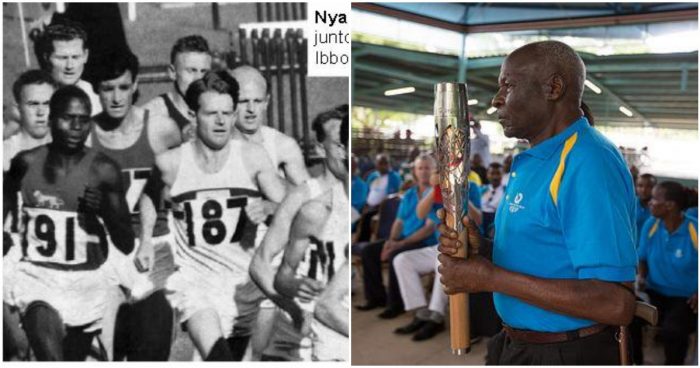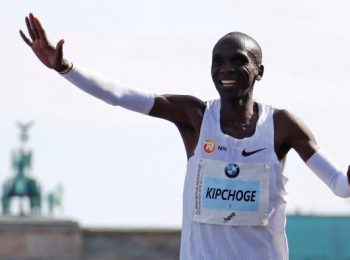Mzee Nyantika Maiyoro, Kenya’s pioneer international athlete, has died at the age of 88.
The trailblazing Maiyoro, who competed for Kenya, under British colonial rule at the 1956 Olympics in Melbourne, Australia, died on Sunday evening at the Christa Marianne Hospital in Kisii.
According to his son Kennedy Nyantika, Mzee Maiyoro, who has been in hospital for close to three weeks, sank into a coma Sunday with breathing problems.
Initially, Nyantika was admitted at the Kisii General Hospital but his family took him back home owing to the nurses’ strike.
But when his condition deteriorated, he was rushed to Christa Marianne Hospital, a private hospital run by the Catholic Diocese of Kisii.
“Mzee has left us. I’m now preparing his body for the morgue,” Nyantika said Sunday night.
Last week, the National Olympic Committee of Kenya and Interior Cabinet Secretary Fred Matiang’i offered to help Maiyoro’s family with medical bills.
Even as he was in hospital, Maiyoro lamented that his 15-acre land, given to him by Kenya’s first President, Mzee Jomo Kenyatta, at independence for his athletics exploits, was being grabbed.
DOUBLE TRAGEDY
Athletics Kenya President Jack Tuwei and the association’s Nyanza South branch chairman Peter Angwenyi sent messages of condolences to the legend’s family on Sunday.
It was double tragedy for the Gusii region as pioneer javelin thrower and former Commonwealth Games javelin bronze medallist, John Mayaka, who hails from the region, also died at the weekend.
“Mayaka, born on in 1948 in Nyamira County, died on Saturday morning at the Nyamira Level Five Hospital, his daughter, Stella Mayaka, confirmed,” said a statement from Athletics Kenya.
“Mayaka participated at the 1974 Commonwealth Games in Christchurch, New Zealand, and 1978 in Edmonton. His best throws were 77.56 metres in Christchurch and 70 metres in Edmonton.
“Mayaka is survived by a wife and eight children,” the statement, signed by Angwenyi, said.
By the time of his death, Mayaka was a member of Athletics Kenya’s Nyamira County. Mayaka worked in the Armed Forces during his athletics years until his retirement on early 1990s.
Tuwei also sent his condolences to the family of the late Mayaka, AK Nyamira, AK Nyanza South and the entire athletics fraternity.
CLASS OF 64
Mzee Maiyoro was among Kenya’s first three competitors in athletics at the Olympics, a breakthrough achieved at the 1956 Games in Melbourne, where Kenya competed for the first time, as a British colony then.
In Melbourne, he featured in the 5,000 metres and finished an impressive seventh (13 minutes, 53.25 seconds) with Kanuti Sum finishing 31st in the marathon (2:58:42) while Joseph Leresae was 18th in the high jump.
Maiyoro and Sum were joined at the 1960 Olympics in Rome by three other athletes — Seraphine Antao (100 metres, 200 metres and 110 metres hurdles), Bartonjo Rotich (400m, 400m hurdles) and Arere Anentia (10,000m) — before paving way for the “Class of 64” at the 1964 Olympics in Tokyo where Wilson Kiprugut bagged Kenya’s first ever Olympic medal, a bronze in the 800 metres.
Of the pioneer athletes from the 1956 Games, Maiyoro was the only one surviving before his death on Sunday
For all his achievements for Kenya, Mzee Maiyoro struggled in retirement.
In October, 2014, he was detained at a Kisii hospital as his family could not raise a Sh39,000 medical bill. “After he recovered considerably, we could not take him home as the hospital’s management told us to settle the Sh39,000 bill first before he could be released,” the legendary athlete’s daughter Melodius Nyanchama Nyantika said at the time.
“Fortunately, we got support from friends who sent us donations which allowed the hospital to discharge him, although we left a Sh7,000 balance.”
Maiyoro also had to put up a fight with individuals who attempted to grab a house the colonial government awarded him for outstanding performances in athletics in 1952.
LAND GRABBERS
It was only after personal interventions by then President Mwai Kibaki and Prime Minister Raila Odinga that the house at the Gusii Stadium was spared.
He died fighting to ward off land grabbers who have encroached on the 15-acre farm in Isoge, Nyamira County.
“The fights with the grabbers have left him weak and contribute a great deal to his medical condition,” Nyanchama said in 2014.
“We have reported several times to the local authorities at Kijauri but nothing has been done and we suspect that they may have been compromised by the same grabbers.”
Speaking at the time at his home in Kiogoro where was recovering, Maiyoro said he held the piece of land at Isoge with affection as it bears sentimental value to him and Kenya’s history.
“Mzee Jomo Kenyatta gave me the land at independence in 1963,” he said.
“I remember it was during a visit to State House in Mombasa that I met Mzee Kenyatta and told him my biggest problem was that I didn’t have any land.
“He then ordered the District Commissioner in Kisii at the time (Isaiah Mathenge) to hand the land to me.”









